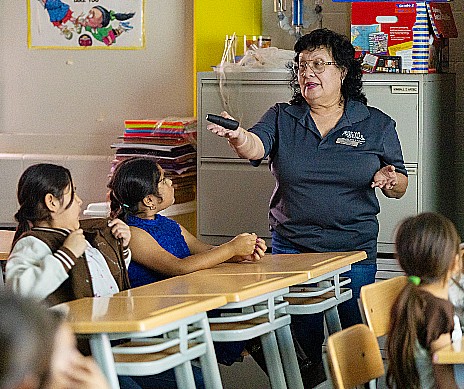

The transition back to school can be both exciting and nerve-wracking, so experts with the Texas A&M Agricultural Extension Service offer some top tips on how adults can help young people navigate this season with confidence and emotional health.
“Parents, teachers and guardians have the greatest influence on the mindsets and attitudes of young people, so it’s important that they set positive examples when motivating students,” said Dr. Lakshmi Mahadevan, mental health and well-being specialist with the Family and Community Health Division at the AgriLife Extension Center in Bryan-College Station.
Tip 1: Cultivate open communication
One of the most valuable things adults can do is to create an environment where children feel comfortable sharing their thoughts and feelings. Children are often reluctant to talk to parents or other adults about their nervousness about entering a new school, worrying about how others will perceive them and how they will fare socially and academically.
“Talk to your child about how they are feeling about returning to school and find ways to support their concerns,” Mahadevan said. “Many students still feel behind academically or are not learning at the same level as before since the pandemic.”
Therefore, it’s a good idea to check in with yourself every few days, asking open-ended questions like, “What was the highlight of your day?” or “Is there anything that’s been bothering you lately?”
Mahadevan said listening without judgement and validating their experiences can make a big difference, adding that it is important to be patient, calm and compassionate when allowing young people to express their feelings.
“It often takes a while for young people to open up and share more deeply about their emotions and mental health-related issues,” she said. “If your child senses that you are impatient or upset, they will be less likely to share their feelings and concerns in the future.”
Tip 2: Promote positive coping strategies
Miquela Smith, health program specialist with the Lubbock branch of AgriLife Extension’s Disaster Assessment and Recovery Division, reiterated that it is normal and healthy to feel angry, frustrated and sad.
Back-to-school season brings a mix of excitement and anxiety. Students’ fears of failure, change, social or other challenges can sometimes manifest as cynicism, anger or frustration. However, Smith said that by understanding the underlying issues students are experiencing, adults can help them cope.
“Accepting and processing the emotions we experience is key to preventing rumination and negative thoughts in the long term,” Smith said. “The focus is on helping students respond to negative emotions rather than react to them.”
She said helping students practice mindfulness allows them to step back when they are frustrated or overwhelmed and helps them identify the most effective way to cope. By doing so, students can choose to replace pessimism with optimism and improve their behavior.
Tip 3: Develop a healthy outlook on life


Healthy routines and structure are extremely beneficial for mental health, especially during transitional times like the start of the school year.
Mahadevan explained that parents can help students reduce stress and frustration by ensuring they have their lives organized and helping to create an environment where they can focus on their studies without distractions.
Some additional suggestions that adults can use to help students develop a more positive mindset include:
- Discuss openly your own setbacks and how you can turn them into growth opportunities.
- Encourage them to learn from their failures and remind them that failure is a natural part of learning.
- Focus on how hard work and persistence can lead to long-term personal growth.
- Support them in pursuing activities they are particularly passionate about.
- Introduce them to simple self-care techniques, such as deep breathing, to help relieve stress.
- Help them name and categorize their emotions so they can more accurately express how they feel.
Tip 4: Encourage self-acceptance and resilience
As a parent, teacher or guardian, your influence can have a huge impact on a student’s confidence level. Reminders and actions can let children know you believe in them, which can help them learn self-confidence and self-acceptance, Mahadevan said.
“Have them think about and identify specific instances in their daily school life where they have demonstrated resilience,” she said. “This can help students recognize their strengths and reinforce positive behaviors.”
Mahadevan said some ways to engage students in active self-awareness and self-reflection include asking them to:
- Think about any recent challenges and ask what strategies they used to overcome them.
- Think back to recent frustrating moments and how you managed to stay calm or motivated.
- Think about when they felt like giving up and ask them what motivated them to keep going.
- Identify things they have tried but were unsure of the possible outcomes and ask how that turned out.
- Imagine how positive self-talk or encouragement could help them when they face a challenge.
Howdy Health is a helpful resource
AgriLife Extension’s Family and Community Health Division helps Texans improve their lives through science-based educational programs designed to improve the overall health and wellness of individuals, families and communities.
The agency’s Howdy Health website provides science-based mental health education to reduce risk, demonstrates how to build emotional resilience, and offers insights on how to create a supportive environment conducive to better mental health.
Additionally, AgriLife Extension has a youth program called “Mindful SELF,” a six-week series of programs that can be implemented in and outside of the classroom to help middle school students develop socially and emotionally.
Contact your local AgriLife Extension agent to ask about this program and other helpful resources.
